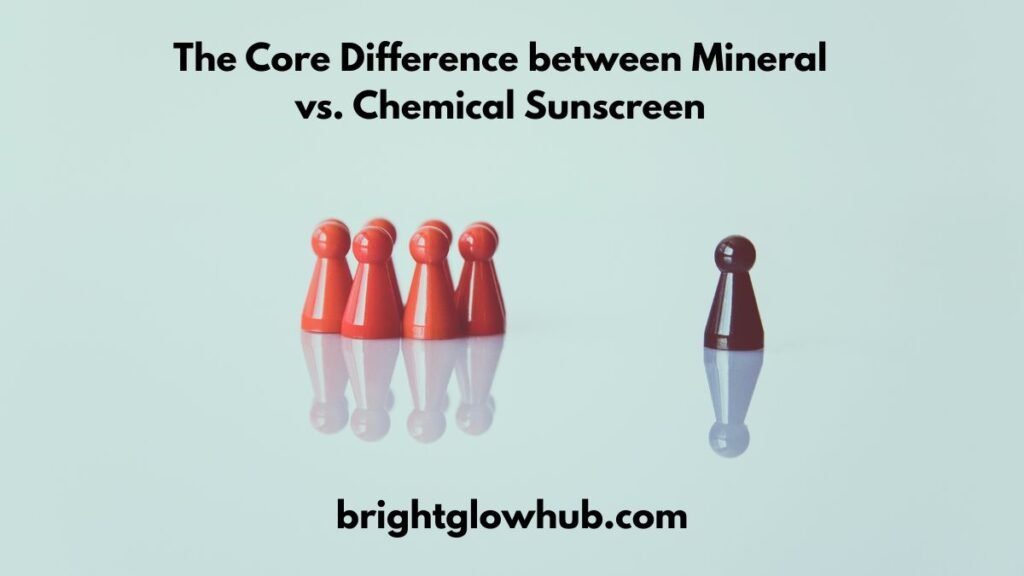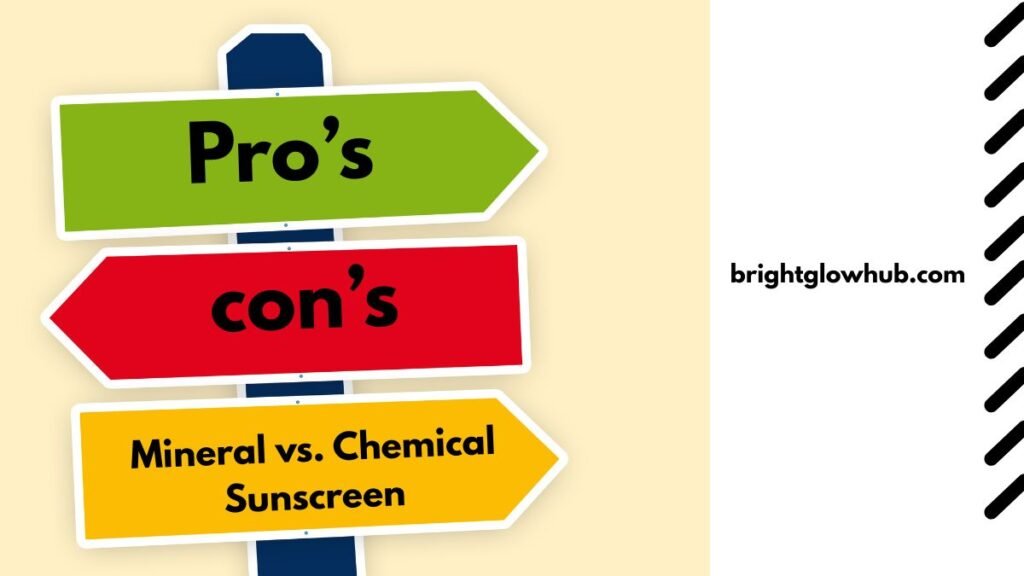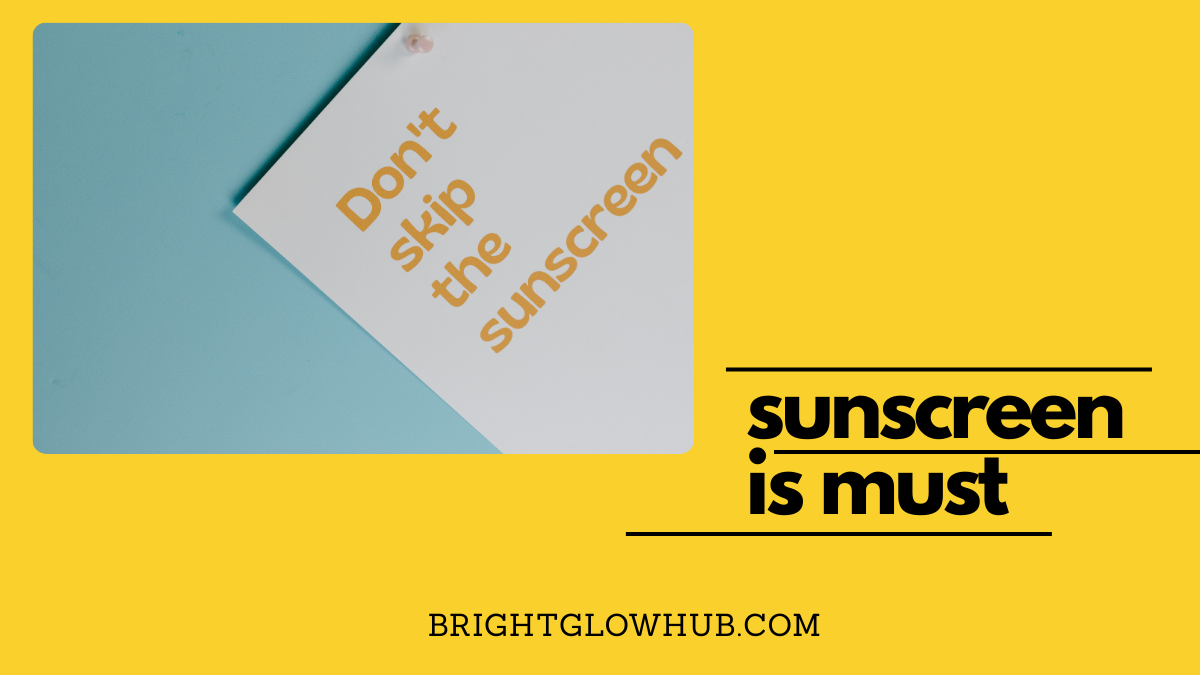It’s a skincare showdown for the ages. You’re standing in the sunscreen aisle, holding two bottles. One boasts a “clean, mineral formula,” the other promises “invisible, lightweight protection.” Your head spins. Which one do you choose? Is one truly better than the other?
let’s dive into it Mineral vs Chemical Sunscreen
The truth is, the best sunscreen is the one you’ll love wearing every single day. But understanding the difference between mineral and chemical formulas is key to finding your perfect match.
Let’s break down this complex debate into simple terms, so you can step out of that aisle feeling confident and protected.
⚠️ IMPORTANT DISCLAIMER: We are not dermatologists or skincare professionals. This article provides general information about sunscreen options for educational purposes only. Product effectiveness varies greatly by individual. We cannot guarantee these products will work for your specific skin type. Always consult a dermatologist for personalized product recommendations, especially if you have persistent acne or sensitive skin. Patch test new products before full application.
The Core Difference between Mineral vs Chemical Sunscreen: How They Work
This is the most important distinction. It’s not just about the ingredients; it’s about their entire mechanism of action.

Mineral Sunscreen: The Physical Shield
- How it works: Think of it as a microscopic, invisible shield sitting on top of your skin. It contains active mineral ingredients, primarily Zinc Oxide and Titanium Dioxide, that physically block UV rays by reflecting and scattering them away from the skin.
- The Analogy: It’s like holding up a mirror to the sun. The rays bounce right off.
Chemical Sunscreen: The Sponge
- How it works: This formula absorbs into your skin. Its active ingredients (like avobenzone, oxybenzone, octinoxate, and homosalate) create a chemical reaction. They absorb UV radiation, convert it into heat, and then release that heat from the skin.
- The Analogy: It’s like a sponge soaking up water, but in this case, it’s soaking up UV rays.
The Pros and Cons: A Quick Breakdown

| Feature | Mineral (Physical) Sunscreen | Chemical Sunscreen |
|---|---|---|
| How it Works | Sits on top of skin, deflects UV rays | Absorbs into skin, converts UV to heat |
| Key Ingredients | Zinc Oxide, Titanium Dioxide | Avobenzone, Oxybenzone, Octinoxate |
| Protection Starts | Immediately upon application | Takes about 15-20 minutes to become effective |
| Best For | Sensitive skin, rosacea, acne-prone skin, children | Daily wear, water resistance, active lifestyles |
| Texture/Finish | Can leave a white cast (though modern formulas are improving); often thicker | Typically lightweight, invisible, and easier to rub in |
| Risk of Irritation | Lower, less likely to clog pores or cause stinging | Higher, can cause stinging or allergic reactions in some |
Which One Is Right For YOU? Let’s Demystify.
The “better” option entirely depends on your skin type, lifestyle, and concerns.
Choose Mineral Sunscreen If…
- You Have Sensitive or Reactive Skin: Mineral formulas are generally gentler and are less likely to cause redness or stinging, especially around the eyes. They are often recommended for those with conditions like rosacea or eczema.
- You’re Acne-Prone: Zinc Oxide is actually anti-inflammatory and can be beneficial for breakout-prone skin.
- You Have Melasma or Hyperpigmentation: The physical barrier of zinc oxide is excellent at blocking the full spectrum of light, including visible light, which can exacerbate melasma in deeper skin tones.
- You Want Protection Immediately: You don’t have to wait for it to “activate.” It works the second you put it on.
- You Prefer “Clean” Beauty Formulas: Mineral sunscreens are often the go-to for those looking to avoid certain chemical filters.
Choose Chemical Sunscreen If…
- You Hate the White Cast: For those with deeper skin tones, chemical sunscreens are historically the winner for leaving no ashy residue. (Though note: many new mineral formulas are now tinted to mitigate this!).
- You Want a Lightweight, Undetectable Feel: Chemical formulas tend to be more elegant, absorb completely, and work well under makeup.
- You Have an Active Lifestyle or Are Swimming: They are often more water- and sweat-resistant without feeling heavy or cakey.
- You Need a Formula for Daily Wear: Their cosmetically elegant finish makes it easier to commit to daily application.
Busting Common Sunscreen Myths
- Myth: “Chemical sunscreens are unsafe.”
- Fact: The FDA has stated that both zinc oxide and titanium dioxide are generally recognized as safe and effective (GRASE). The debate around the systemic absorption of some chemical filters is ongoing, but there is no conclusive evidence that they are harmful to human health at the doses used in sunscreen. The proven risk of skin cancer from unprotected sun exposure far outweighs any potential, unproven risk from chemical filters.
- Myth: “Mineral sunscreens are all pasty and white.”
- Fact: This is rapidly changing! Brands have innovated with micronized particles and tinted formulations that blend seamlessly into a wide range of skin tones. You no longer have to choose between protection and aesthetics.
You might be interested in :
Best Budget Sunscreens Under ₹400 in India
I usually prefer derma co mineral sunscreen which is Ultra Light Zinc Mineral Sunscreen
Frequently Asked Questions on Mineral vs. Chemical Sunscreen
1. Is mineral sunscreen safer than chemical sunscreen?
Both mineral and chemical sunscreens are considered safe by the FDA. Mineral sunscreens are often better tolerated by sensitive or acne-prone skin, while chemical sunscreens are preferred for their lightweight and invisible finish
2. Can I use mineral sunscreen if I have oily or acne-prone skin?
Yes. Mineral sunscreens with Zinc Oxide are anti-inflammatory and can help calm acne. Look for lightweight or gel-based mineral formulas if you have oily skin.
3. Do chemical sunscreens cause skin damage or hormone disruption?
Some studies have shown systemic absorption of certain chemical filters, but there is no conclusive evidence that they cause harm at sunscreen-level doses. Dermatologists still recommend chemical sunscreens as safe and effective.
4. Which sunscreen works immediately after applying?
Mineral sunscreens start working the moment you apply them. Chemical sunscreens need about 15–20 minutes to become effective.
5. Can I wear chemical sunscreen under makeup?
Yes. Chemical sunscreens are generally lightweight, absorb quickly, and layer well under makeup without pilling or leaving residue.
6. Can I use both mineral and chemical sunscreen together?
Yes. Many hybrid sunscreens combine both filters to provide broad-spectrum protection with a more cosmetically elegant finish.
The Final Verdict: It’s Not a War, It’s a Wardrobe
So, which is better? They both are.
The goal is sun protection, period. Whether you achieve that with a mineral shield or a chemical sponge is a matter of personal preference.
- For daily, elegant wear: You might prefer a chemical serum or lotion.
- For sensitive skin or a day at the beach: A mineral formula might be your hero.
- The ultimate combo? Many fantastic hybrid sunscreens now use a mix of both mineral and chemical filters to provide broad-spectrum protection with a cosmetically elegant finish.
The best sunscreen is not mineral or chemical—it’s the one you’ll actually use generously and reapply consistently.
What’s your sunscreen type? Are you Team Mineral, Team Chemical, or Team Hybrid? Share your favorite brand in the comments below!
